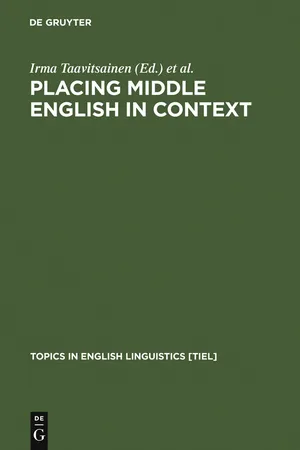
eBook - PDF
Placing Middle English in Context
- 528 pages
- English
- PDF
- Available on iOS & Android
eBook - PDF
Placing Middle English in Context
About this book
No detailed description available for "Placing Middle English in Context".
Tools to learn more effectively

Saving Books

Keyword Search

Annotating Text

Listen to it instead
Information
Table of contents
- Preface
- Introduction
- Chronological and social context
- Language periodization and the concept “middle”
- Language and society in twelfth-century England
- Syntactic constraints on code-switching in medieval texts
- Dialect, normalization and corpus-linguistic methodology
- Introduction
- Never the twain shall meet. Early Middle English – The East-West divide
- Standard language in Early Middle English?
- Changing spaces: Linguistic relationships and the dialect continuum
- Normalizing the word forms in the Ayenbite of Inwyt
- Chaucer’s spelling and the manuscripts of the Canterbury Tales
- WHICH and THE WHICH in Late Middle English: Free variants?
- Lexical semantics
- Introduction
- Robbares and reuares at ryche men despoilen: Some competing forms
- Here comes the judge: A small contribution to the study of French input into the vocabulary of the law in Middle English
- Naming and avoiding naming objects of terror: A case study
- An application of the Natural Semantic Metalanguage to diachronic semantics
- Patterns of semantic change in abstract nouns: The case of wit
- The spatial and temporal meanings of before in Middle English
- The adjective weary in Middle English structures: A syntactic-semantic study
- Utterance and discourse meaning
- Introduction
- Slanders, slurs and insults on the road to Canterbury: Forms of verbal aggression in Chaucer’s Canterbury Tales
- Hir not lettyrd: The use of interjections, pragmatic markers and whan-clauses in The Book of Margery Kempe
- Whoso thorgh presumpcion ... mysdeme hyt: Chaucer’s poetic adaptation of the medieval “book curse”
- Sounds, prosody and metre
- Introduction
- Middle English prosodic innovations and their testability in verse
- Old English (non)-palatalised */k/: Competing forces of change at work in the “seek”-verbs
- Some remarks on the nonprimary contexts for Homorganic Lengthening
- On the phonetic and phonological interpretation of the reflexes of the Old English diphthongs in the Ayenbite of Inwyt
- Author index
- Subject index
Frequently asked questions
Yes, you can cancel anytime from the Subscription tab in your account settings on the Perlego website. Your subscription will stay active until the end of your current billing period. Learn how to cancel your subscription
No, books cannot be downloaded as external files, such as PDFs, for use outside of Perlego. However, you can download books within the Perlego app for offline reading on mobile or tablet. Learn how to download books offline
Perlego offers two plans: Essential and Complete
- Essential is ideal for learners and professionals who enjoy exploring a wide range of subjects. Access the Essential Library with 800,000+ trusted titles and best-sellers across business, personal growth, and the humanities. Includes unlimited reading time and Standard Read Aloud voice.
- Complete: Perfect for advanced learners and researchers needing full, unrestricted access. Unlock 1.4M+ books across hundreds of subjects, including academic and specialized titles. The Complete Plan also includes advanced features like Premium Read Aloud and Research Assistant.
We are an online textbook subscription service, where you can get access to an entire online library for less than the price of a single book per month. With over 1 million books across 990+ topics, we’ve got you covered! Learn about our mission
Look out for the read-aloud symbol on your next book to see if you can listen to it. The read-aloud tool reads text aloud for you, highlighting the text as it is being read. You can pause it, speed it up and slow it down. Learn more about Read Aloud
Yes! You can use the Perlego app on both iOS and Android devices to read anytime, anywhere — even offline. Perfect for commutes or when you’re on the go.
Please note we cannot support devices running on iOS 13 and Android 7 or earlier. Learn more about using the app
Please note we cannot support devices running on iOS 13 and Android 7 or earlier. Learn more about using the app
Yes, you can access Placing Middle English in Context by Irma Taavitsainen, Terttu Nevalainen, Päivi Pahta, Matti Rissanen, Irma Taavitsainen,Terttu Nevalainen,Päivi Pahta,Matti Rissanen in PDF and/or ePUB format, as well as other popular books in Languages & Linguistics & Grammar & Punctuation. We have over one million books available in our catalogue for you to explore.